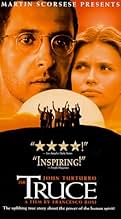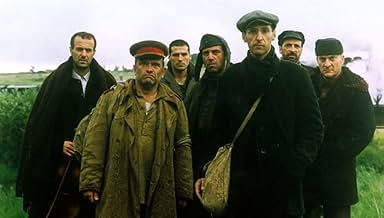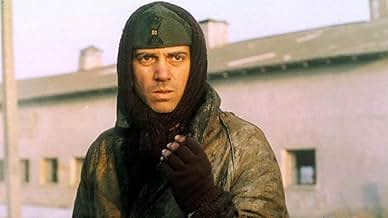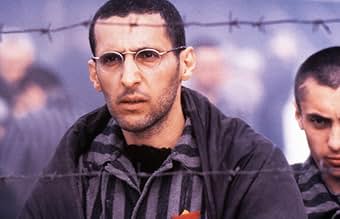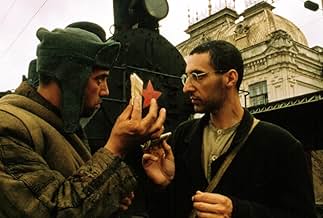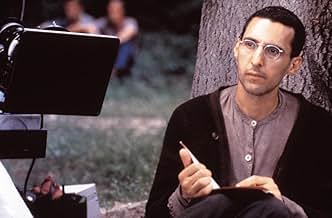VALUTAZIONE IMDb
6,6/10
1929
LA TUA VALUTAZIONE
Tratto dall'autobiografico "Il risveglio" di Primo Levi.Tratto dall'autobiografico "Il risveglio" di Primo Levi.Tratto dall'autobiografico "Il risveglio" di Primo Levi.
- Regia
- Sceneggiatura
- Star
- Premi
- 7 vittorie e 9 candidature totali
Tatyana Cherkasova
- Irina
- (as Tatyana Meshcherina)
Recensioni in evidenza
"The Truce" is unlike any other Holocaust film I've ever seen in at least two respects. First, it is focused on the return to their homes via the Soviet Union of a group of survivors from Auschwitz. Second, the events are distilled through the eyes of a particular victim, Primo Levi, an Italian chemist and disbelieving Jew, who recorded his experiences in an autobiographical memoir, "The Reawakening," transformed into a film by the Italian director, Francesco Rosi. Levi himself is portrayed by John Turturro, the only name likely to be recognized by an American audience. Turturro is a skilled actor and his performance is marked by emotional restraint. There are some telling scenes in the movie (and improbable coincidences relating to reappearance of characters who had previously departed the scene for destinations unknown). What holds the film together and makes it worth seeing is Levi's sensibility and occasional direct quotes: e.g., "In a world where there is Auschwitz, there is no God." This is not a great movie but it is very good.
This is a good adaptation based on Primo Levi book about his risked odyssey post-war, as he is back to Italy across several European countries to arrive in Italy. Main character is Primo Levi himself, John Turturro who committed the project long time ago, playing a loner and observer ex-inmate who flees from Auschwitz concentration camp and shortly after he carries out an ardous journey home to Turin. Being accompanied by other prisoners, the unfortunate compadres : Massimo Ghini, Rade Serbezja, Stefano Dionisi, all of them go crossing diverse countries to get their destination.
It is a worthy exercice but results to be slow-moving and boring, at times. Being well produced by the great producer Dino De Laurentiis, appropriately photographed by Pasqualino Di Santis and professionally directed by Francesco Rosi, though it has some flaws and gaps. It is a nice and thought-provoking film, but not excellent, concerning Primo Levi's traveling, as well as his slow rediscovery of hope and life . Including some flashbacks about the Auschwitz concentration camp with sad and violent frames . It has the usual trappings of a grand historical fresco, but it results to be more an introspective drama than an epic movie. To be sure the movie is enjoyable and strong, regarding the plight of the future novelist Levi and other survivors from Auschwitz and other concentration camps. As trivia to add Primo Levi committed suicide in 1987, bit later on giving Franco Rosi's rendition his blessing. A sensitive and brooding picture dealing with doubts facing the liberated prisoners and psychological dilemmas . Here a compelling but understated John Turturro gives a fine acting, delivering the best interpretation of his long career, as the ex-prisoner attempting to reclaim his humanity later experiencing unimaginable terror and distress.
It contains a sensitive and moving musical score by Luis Bacalov. As well as evocative and adequate cinematography by Pasqualino De Santis. And efficiently directed by Francesco Rosi, providing an introspective look about Nazism consequences with harrowing scenes, though including some failures. Francesco Rosi was a pretty good Italian filmmaker wo directed intense drama such as : Three brothers, Christ stopped at Eboli, Lucky Luciano, The Palermo connection, Carmen, and this The Truce. Rating 6.5/10. Decent and better than average movie.
It is a worthy exercice but results to be slow-moving and boring, at times. Being well produced by the great producer Dino De Laurentiis, appropriately photographed by Pasqualino Di Santis and professionally directed by Francesco Rosi, though it has some flaws and gaps. It is a nice and thought-provoking film, but not excellent, concerning Primo Levi's traveling, as well as his slow rediscovery of hope and life . Including some flashbacks about the Auschwitz concentration camp with sad and violent frames . It has the usual trappings of a grand historical fresco, but it results to be more an introspective drama than an epic movie. To be sure the movie is enjoyable and strong, regarding the plight of the future novelist Levi and other survivors from Auschwitz and other concentration camps. As trivia to add Primo Levi committed suicide in 1987, bit later on giving Franco Rosi's rendition his blessing. A sensitive and brooding picture dealing with doubts facing the liberated prisoners and psychological dilemmas . Here a compelling but understated John Turturro gives a fine acting, delivering the best interpretation of his long career, as the ex-prisoner attempting to reclaim his humanity later experiencing unimaginable terror and distress.
It contains a sensitive and moving musical score by Luis Bacalov. As well as evocative and adequate cinematography by Pasqualino De Santis. And efficiently directed by Francesco Rosi, providing an introspective look about Nazism consequences with harrowing scenes, though including some failures. Francesco Rosi was a pretty good Italian filmmaker wo directed intense drama such as : Three brothers, Christ stopped at Eboli, Lucky Luciano, The Palermo connection, Carmen, and this The Truce. Rating 6.5/10. Decent and better than average movie.
This movie is based on the true events that took place in one of the most renowned Auschwitz prisoners Primo Levi. More specifically, it is the last book of his experiences, whereby this book starts at the moment that Auschwitz is liberated, i.e. As end of january 1945. It describes his experiences he had during his travels in the soviet liberated part of the former Nazi empire.
Note: for the people that have never heard of "Is this a Man" - which describes his experiences in Auschwitz - one of the most impressive books that I have ever read.
With great acting and stunning scenes it is an altogether convincing image of how the situation may have been in the period up to the end of the war. It does not show the continuous women abuse that was ongoing during those times, but it shows that hunger and food were a day to day battle.
Overall, this movie deserves a score of 7.4 / 10, resulting in a very well earnt 7 star IMDb rating. I am personally surprised by the fact that this movie is not more known.
Note: for the people that have never heard of "Is this a Man" - which describes his experiences in Auschwitz - one of the most impressive books that I have ever read.
With great acting and stunning scenes it is an altogether convincing image of how the situation may have been in the period up to the end of the war. It does not show the continuous women abuse that was ongoing during those times, but it shows that hunger and food were a day to day battle.
Overall, this movie deserves a score of 7.4 / 10, resulting in a very well earnt 7 star IMDb rating. I am personally surprised by the fact that this movie is not more known.
I have read "Se questo è un uomo" 15 times, and I also consider "La Tregua" as one of the most extraordinary Odysseys of our times. I can hardly find any of Levi's masterpieces in this hodgepodge of episodes, hardly connected to each other and with barely any historical explanation of the events. Several comments about god and religion reported in the movie were not even present in the book, giving the impression that the director wanted to twist Levi's thought to serve his own philosophical agenda. The movie relies too much on images and too little on Levi's own considerations. Some effort has been put in trying to represent the chaotic world of those times, but I would have appreciated less scenic representation and more intimate comments.
There are books and films. Two different ways of telling a story. Sometimes films are based on books. In that case one does good by not concentrating on the book and see the film as an independent work of art. Barthes already proclaimed 'the death of the writer', the discourse is not a message of the writer. But sometimes it's impossible to ignore the writers' work and his message. This is the case with one of this centuries' most important writers, Primo Levi. He didn't just write books, but was able to put in words his very own experiences in the German Lagers and this way put it in a much broader sense, he wrote history.
Many years before, Rosi had succesfully filmed 'christ stopped at Eboli', which was also based on an autobiography (Carlo Levi, not related to Primo) of the fascist period. Rosi did well not to choose Primo Levi's 'if this is a man' (se questo e un uomo), which describes the unimaginable experiences of Levi in the German Lager, he chose what could be called its' 'sequel'. 'the truce' ('la tregua') in which Levi describes his journey home from the camp in Poland to Turin, Italy, which took him an absurd nine months.The film starts when killingfactory Auschwitz-Birkenau is liberated by the Russians and the survivors are freed and put in trains, not to go home directly, but to be send to other camps. From there the journey continues, by train, by foot, meeting various characters. Levi, played by John Torturro, is a silent man who now and then expresses wise words or memorable sentences, but somehow never really makes you think. It's a man we follow, but doesn't touch us, let alone move us. This is not Turturro's fault, he gives a fairly good performance, but Rosi wants too much tell an important story, forgetting the ones who ARE the story; namely the characters. None of them is very well worked out. Take the Greek Nahum, in the book a surpising, colourful person, here just one-dimensional. Symbolism is overly present; Levi who doesn't want to throw away his campjacket, 'to remember' is credible, but the survivors are faced with german prisoners twice and it's given an unconvincing weight, as one German throws himself on his knees, when he sees Levi and his yellow star of David, far too grotesque. Another unconvincing role is given to the music, it's overly present, even a violin is stolen (where Rosi had this idea from is very unclear??) for no good reason. Music should be on the background.
I am sure Rosi had good intentions, but sometimes it's better to read and reread a book and try to reach as many people as possible in that way.
**out of ***** If this is a man (se questo e un uomo)-primo Levi The truce (La tregua) - Primo levi The saved and the drowned (I sommersi e i salvati)-Primo levi
Many years before, Rosi had succesfully filmed 'christ stopped at Eboli', which was also based on an autobiography (Carlo Levi, not related to Primo) of the fascist period. Rosi did well not to choose Primo Levi's 'if this is a man' (se questo e un uomo), which describes the unimaginable experiences of Levi in the German Lager, he chose what could be called its' 'sequel'. 'the truce' ('la tregua') in which Levi describes his journey home from the camp in Poland to Turin, Italy, which took him an absurd nine months.The film starts when killingfactory Auschwitz-Birkenau is liberated by the Russians and the survivors are freed and put in trains, not to go home directly, but to be send to other camps. From there the journey continues, by train, by foot, meeting various characters. Levi, played by John Torturro, is a silent man who now and then expresses wise words or memorable sentences, but somehow never really makes you think. It's a man we follow, but doesn't touch us, let alone move us. This is not Turturro's fault, he gives a fairly good performance, but Rosi wants too much tell an important story, forgetting the ones who ARE the story; namely the characters. None of them is very well worked out. Take the Greek Nahum, in the book a surpising, colourful person, here just one-dimensional. Symbolism is overly present; Levi who doesn't want to throw away his campjacket, 'to remember' is credible, but the survivors are faced with german prisoners twice and it's given an unconvincing weight, as one German throws himself on his knees, when he sees Levi and his yellow star of David, far too grotesque. Another unconvincing role is given to the music, it's overly present, even a violin is stolen (where Rosi had this idea from is very unclear??) for no good reason. Music should be on the background.
I am sure Rosi had good intentions, but sometimes it's better to read and reread a book and try to reach as many people as possible in that way.
**out of ***** If this is a man (se questo e un uomo)-primo Levi The truce (La tregua) - Primo levi The saved and the drowned (I sommersi e i salvati)-Primo levi
Lo sapevi?
- QuizFinal film written and directed by Francesco Rosi.
- Citazioni
[last lines]
Primo Levi: [narrating] You who live secure in your warm houses, who return at evening to find hot food and friendly faces. Consider if this is a man who labors in the mud, who knows no peace, who fights for a crust of bread, who dies at a yes or a no. Meditate that this took place.
- ConnessioniFeatured in The Movie Show: Episodio datato 19 ottobre 1997 (1997)
- Colonne sonoreMadonina
Written by Giovanni D'Anzi (as G. D'Anzi)
I più visti
Accedi per valutare e creare un elenco di titoli salvati per ottenere consigli personalizzati
- How long is The Truce?Powered by Alexa
Dettagli
Botteghino
- Lordo Stati Uniti e Canada
- 71.448 USD
- Fine settimana di apertura Stati Uniti e Canada
- 23.165 USD
- 26 apr 1998
- Tempo di esecuzione
- 2h 5min(125 min)
- Colore
- Mix di suoni
- Proporzioni
- 1.85 : 1
Contribuisci a questa pagina
Suggerisci una modifica o aggiungi i contenuti mancanti

